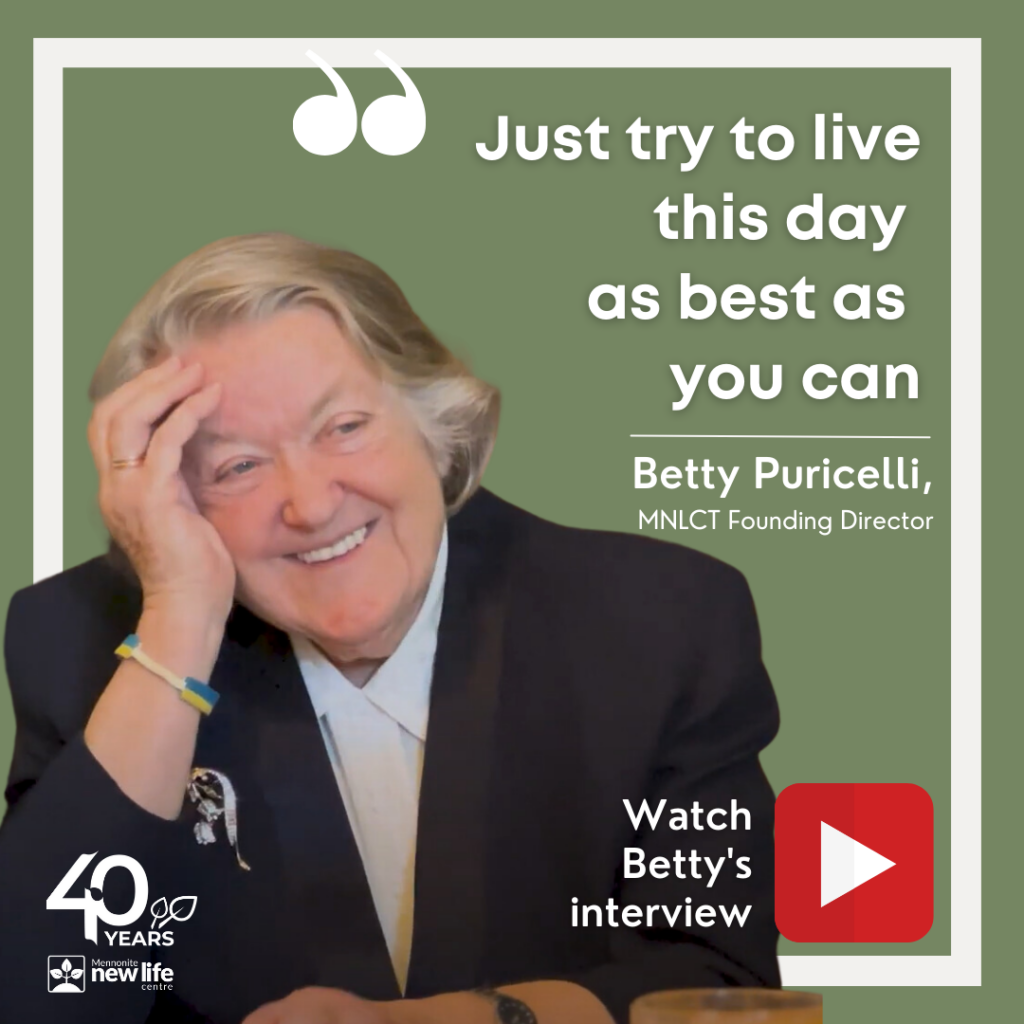In 1983, Betty Puricelli and her late husband Adolfo Puricelli founded the Mennonite New Life Centre of Toronto.
Here is Betty’s story about MNLCT’s early days.
By Trudy Tumusime
In 1983, Betty Puricelli and her late husband Adolfo Puricelli, embarked on an extra-ordinary journey that would forever shape the service of newcomers to Canada. With a shared vision, the Argentinian couple who were students at the Mennonite Seminary in Indiana, USA, moved to Canada with their three children, to start the work of serving refugees. The Mennonite Church of Toronto’s mission board invited Adolfo to study the Latin American refugee situation in Canada and propose ways they could help.
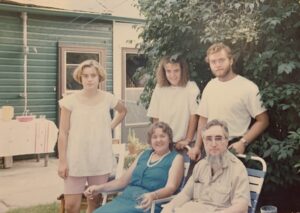
Why Adolfo was selected for the job
Betty speaks of Adolfo’s selection for the task, explaining that he had extensive international experience working for the Bible Society in Central America, allowing him to understand the region’s social and political spheres. With a background in sociology and theology, Adolfo had the knowledge and ability to analyze the society and its problems and provide solutions.
Betty fondly recalls Adolfo’s prophetic words upon arrival from Central America, when they still lived in Argentina, saying, “We are living on the edge of a volcano and that volcano is going to erupt at any moment.”
Adolfo’s words proved true as civil wars erupted in several countries in central America in the late 1970s, leading to a refugee influx in Canada.
The birth of MNLCT
After spending five months in 1982 conducting a feasibility study, Adolfo presented his proposal which included the creation of a refugee serving organization that would be called the Mennonite New Life Centre of Toronto. He was formally invited to come and start the organization.
The couple first lived at 47 Afton Road in Toronto’s west end when they arrived. Their home doubled as the Centre’s office.
That’s how we came to know people, and they became part of our family, and our home became a base, where the Centre operated and where people came together.” Betty says.
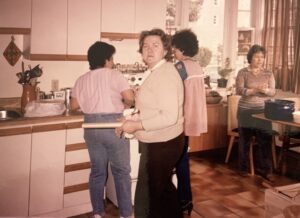
As the number of clients grew, the Puricellis moved to a larger house at 833 Coxwell Avenue, where they lived for two and a half years before moving to 2085 Danforth Road. Before moving to Danforth, St. Claire O’Connor, another Mennonite Church project, offered a large unit to the Centre, where they established a reception house for refugees until they found permanent housing.
Client centered services
Betty and Adolfo personalized services to each client’s needs. Betty still recalls Don Franscisco, one of the early clients who arrived towards the winter, and was amazed by the snow, but was later delighted when the spring came.
“He was very limited in what he could do,” says Betty of Don. “He couldn’t find an address, and he had never had much schooling, and he didn’t understand the system.”
Adolfo dedicated a month to help Don navigate the Canadian system by going with him to all appointments to translate. This helped Adolfo learn about the court, welfare, schooling system, and everything in between. He learned how to advocate for immigrants.
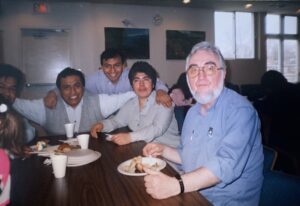
“There is a park in Toronto called the Sunken Park, which was across from where one of the refugee houses, where people would be sitting there and when they saw the police, they could get up and run and the police could run after them,” Betty narrates, saying Adolfo had to educate the police that the people weren’t running away from them but from what happened to them in the countries they fled.
Maria Lenna, a widow from Columbia was another client who received assistance from the Centre.
“Her husband had just died. She had never been able to go to school. She had survived in the USA to make money to send money back for her children,” Betty recalls.
The Centre prepared paperwork to bring Maria’s children to Canada and helped them to settle in when they arrived.
Betty also prides herself in the story of a little boy Juan Carlos, who was sponsored with his mother by the church in 2005. Juan, who suffers from Spina Bifida, couldn’t walk and only dragged himself on the floor. Betty and Adolfo prepared the paperwork to obtain Juan his first ever wheelchair through the disability programs Canada offered. Juan is now a wheelchair basketball champion.
Building a strong community to serve newcomers
When they started, Betty provided translation services for the refugees, many of whom had limited English abilities.
“The people would be in their houses. Next door there would be someone from Bangladesh, Haiti, but would just lock themselves in because they didn’t have anyone to talk to,” Betty remembers. “So, we started going to ask them what appointments they had, and we could go to translate for them.”
Betty and Adolfo tirelessly recruited passionate volunteers for the cause. They encouraged everyone they knew or came across to contribute their time and skills to support the refugees.
Soon, volunteers who spoke different languages joined the team. One of the first volunteers was a doctor who had just returned from Australia from studying and seeing the work the Puricellis were doing, decided to learn Spanish to help with translation. Another volunteer, an artist, offered art therapy to help with the clients’ mental health needs. A generous family of five also dedicated their time as translators.
With the growing support, the MNLCT community flourished, positively impacting not only the lives of the clients, but also those of Betty, Adolfo and the volunteers.
One volunteer’s life changed forever through his service of others.
“He took courses on how to control violence and he could teach other men the same.”
Eventually, he started the first MNLCT newsletter.
Services for everyone
People came to the church because they thought that way they would get better service,” Betty explains. “But Adolfo was always very clear, and he would say to them, you don’t need to come to the church to receive our services.”
This emphasized that the Centre’s was inclusive and served everyone regardless of their background and religious inclination.
Gaining recognition and support
As word about the Centre’s exceptional work with refugees spread, Betty and Adolfo gained recognition and support from the community. A generous individual donated $5000, allowing them to hire staff to alleviate the workload. They hired a housing worker to address the urgent need for permanent housing. This attracted more funding from the immigration department to hire more staff and MNLCT was recognized as a non-governmental organization (NGO).
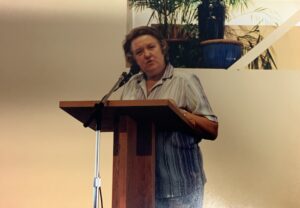
With the Centre’s growth, there was a need for more space to accommodate all its clients, staff and activities. On the other hand, the Mennonite Church also needed to expand. Through a grant, the Queen Street building, which currently houses both the Centre’s head office and the Toronto United Mennonite church was constructed.
Navigating challenges
Betty and Adolfo faced numerous challenges in the early days of the Centre, but they managed to overcome them. One of the challenges Betty can never forget was when the couple went away for some time, for Betty to study spiritual direction, and the people who stood in for them failed to maintain stability, leading to fluctuations and disintegration upon their return.
Betty reflects, “If I hadn’t studied what I had gone to study, I wouldn’t have known how to react to all the things that had happened.”
Adolfo’s vision for the Centre
Adolfo envisioned the Centre as a place where people would receive what they needed for their adjustment in Canada. Betty believes that healing from one’s own trauma is often neglected in the settlement process.
“Adolfo advised the English teachers to teach and let the students to live their grief and talk about it.”
He recognized the importance of addressing emotional wellbeing while offering services. Betty praises MNLCT for providing this missing piece to newcomers.
“The work of healing that the new life Centre is doing, they offer a therapy of compassion. I think that’s a very wonderful service that the staff are offering to newcomers.”
Although Betty is no longer actively involved with the Centre, she remains dedicated to helping newcomers and often refers clients to the Centre. Her advice to newcomers is to take things one day at a time and not be anxious about future uncertainties
The future
As we celebrate this incredible journey of forty years, we owe a debt of gratitude to our founders, Betty and Adolfo Puricelli. Their unwavering dedication transformed the initial vision of the Centre into an organization that continues to impact lives. MNLCT stands today as a testament to their vision, hard work and belief in the transformative power of community.


